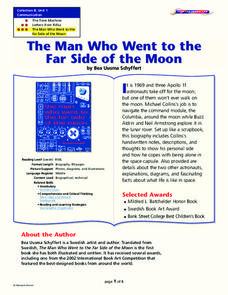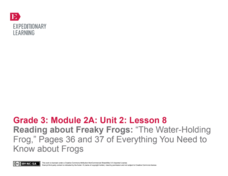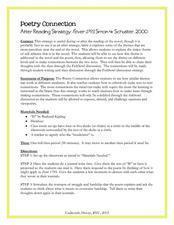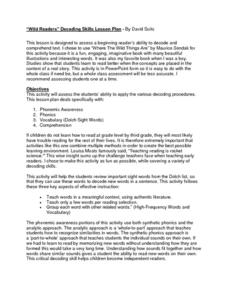Curated OER
Simple Preparation Can Improve Reading Comprehension
Reading comprehension is key to success in nearly every subject in school, but how do you improve comprehension in a pupil with dyslexia? Here are several tips that define ways in which educators can provide strategies to improve overall...
Curated OER
Using the Comprehension Strategies
High school learners review the six major reading comprehension strategies. They demonstrate the strategies by putting them into action using more complex reading. They finish by discussing a seventh strategy, monitoring comprehension.
Curated OER
8th Grade Reading Comprehension Success
Augment your eighth grade language arts curriculum with a thorough set of reading comprehension activities and assessments. Focusing on a variety of skills, including vocabulary in context, text structure, main idea, and author's style,...
Southern Nevada Regional Professional Development Program
Close Reading in the Classroom
Close reading is key to the analysis and interpretation of literature. A close reading of the title and the epigraph of “The Love Song of J. Alfred Prufrock” offers readers an opportunity to examine how even single words or names can...
Curated OER
What We Eat, Where We Sleep: Documenting Daily Life to Tell Stories
This is not just a New York Time article to read, this is a set of amazing activity ideas all related to the slide shows "Breaking Bread Everywhere" and "Where Children Sleep." Your class can view each show, read about what they mean...
Curated OER
Lesson Plan for Scaffolding Complex Texts
Enhance a class read-aloud of the children's story Hi! Fly Guy with this reading comprehension lesson. Children first listen as the teacher reads the story, stopping along the way to discuss any unfamiliar vocabulary. The book is then...
EngageNY
Developing Reading Fluency: Selecting a Text and Practicing Reading Aloud
Young readers continue to strengthen their fluency skills with a text of their choosing. The teacher first engages the class with an audio recording or read-aloud of a short poem, modeling for children how to read fluently. Next it's...
Curated OER
Reading Comprehension
Using either online worksheets or print outs, 12th graders practice expository text comprehension skills by answering multiple choice questions, completing a vocabulary matching activity, and completing a crossword puzzle. This is...
Curated OER
Listening Comprehension: Answering High Level Questions
Kndergarteners work to build strong listening and reading comprehension skills by answering higher level questions. After a teacher demonstration of the task, learners listen to the story The Three Little Pigs, the teacher asks them...
EngageNY
Reading about Freaky Frogs: “The Glass Frog”
Freaky frogs are the focus of a lesson plan designed to boost reading comprehension skills using text features and asking and answering questions. Informational text and a poem supply scholars with animal-related vocabulary and facts. A...
Curated OER
Dracula: Directed Reading Thinking Activity (DRTA)
“There are often dangers from snow and wolves and night.” Bram Stoker’s “Dracula’s Guest,” which may or may not have been the first chapter of the original Dracula manuscript, is the focus of a Directed Reading Thinking Activity (DRTA).
Curated OER
Two Greedy Bears
Improving listening comprehension skills is the goal of this language arts instructional activity. Young readers listen to the story Two Greedy Bears, stopping to have discussions with a partner. They predict outcomes and make inferences...
Curated OER
The Man Who Went to the Far Side of the Moon
Practice comprehension skills using the story, The Man Who Went to the Far Side of the Moon by Bea Uusma Schyffert. Learners answer questions, fill out graphic organizers, and engage in extension activities involving writing and...
Curated OER
Bounce into Speedy Reading: Growing Fluency and Independence
Increased reading comprehension begins with decoding and automatically recognizing words, which is the focus of this instruction. Using their choice of six different Winnie the Pooh stories, partners practice a variety of strategies for...
Curated OER
Breaking News: English Athlete's Hairstyles
Practice vocabulary and speaking skills in this ESL reading comprehension lesson. Middle and high schoolers participate in a number of before, during, and after reading activities based on an article entitled "Footballer Sent Off for...
Curated OER
Active Reading with American History
Explore connections within and between informational texts with this lesson about encyclopedia articles. Middle schoolers write encyclopedia articles focusing on topics in American history. They discuss how to determine credibility...
Shmoop
ELA.CCSS.ELA-Literacy.RI.11-12.5: Structure of an Argument
Imagine a cross-curricular project that not only rewards learners for examining the textbooks used in their other classes but builds literacy skills as well! Groups compare the formats and writing style in their various textbooks. Teams...
Curated OER
Reading Comprehension
Help your learners build their reading comprehension by setting up the suggested learning stations. First, hold up a detailed picture of your choosing. Give your class 30 seconds before turning the picture over. How much of the image can...
EngageNY
Asking and Answering Questions: Reading about a Frog's Habitat
Building upon previous lessons, scholars take to asking and answering questions about a frog's habitat. A partner discussion follows a read-aloud of an informational text in preparation for a worksheet that boosts reading comprehension...
EngageNY
Reading about Freaky Frogs: “The Water-Holding Frog"
Boost reading comprehension skills with a lesson all about freaky frogs. A poem hooks scholars and takes them into a reading of an informational text followed by peer discussions. A three-page worksheet focuses on text features and...
Curated OER
Poetry Connection: After Reading Strategy for Fever 1793
“If you can meet with Triumph and Disaster/And treat those two impostors just the same. . .” After concluding Fever 1793 class members engage in a reading strategy that asks them to connect their thoughts about the self-reliance theme in...
Guam Community College
Joseph Had a Little Overcoat
Spruce up a class reading of the children's book Joseph Had a Little Overcoat by Simms Taback with this fun series of activities. Starting with a list of reading comprehension questions and key vocabulary to address during a teacher read...
David Suits
“Wild Readers” Decoding Skills Lesson Plan
Set young readers on the path toward fluency with this phonemic awareness resource. Based on the award-winning children's book, Where the Wild Things Are, this lesson allows beginning readers to practice isolating phonemes and...
EngageNY
End of Unit 2 Assessment: Working with Two Texts - Reading, Listening, Summarizing, and Synthesizing
As a summative assessment for this unit on colonial trade, fourth graders listen to and read informational texts in order to demonstrate their ability to take notes, write summaries, and draw connections. Young scholars first listen as...

























